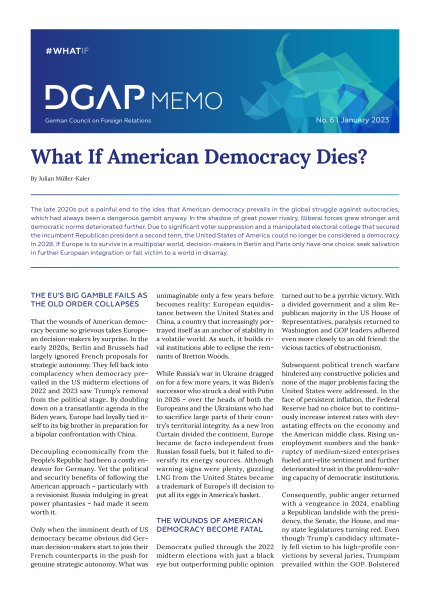The EU’s Big Gamble Fails as the Old Order Collapses
That the wounds of American democracy became so grievous takes European decision-makers by surprise. In the early 2020s, Berlin and Brussels had largely ignored French proposals for strategic autonomy. They fell back into complacency when democracy prevailed in the US midterm elections of 2022 and 2023 saw Trump’s removal from the political stage. By doubling down on a transatlantic agenda in the Biden years, Europe had loyally tied itself to its big brother in preparation for a bipolar confrontation with China.
Decoupling economically from the People’s Republic had been a costly endeavor for Germany. Yet the political and security benefits of following the American approach – particularly with a revisionist Russia indulging in great power phantasies – had made it seem worth it.
Only when the imminent death of US democracy became obvious did German decision-makers start to join their French counterparts in the push for genuine strategic autonomy. What was unimaginable only a few years before becomes reality: European equidistance between the United States and China, a country that increasingly portrayed itself as an anchor of stability in a volatile world. As such, it builds rival institutions able to eclipse the remnants of Bretton Woods.
While Russia’s war in Ukraine dragged on for a few more years, it was Biden’s successor who struck a deal with Putin in 2026 – over the heads of both the Europeans and the Ukrainians who had to sacrifice large parts of their country’s territorial integrity. As a new Iron Curtain divided the continent, Europe became de facto independent from Russian fossil fuels, but it failed to diversify its energy sources. Although warning signs were plenty, guzzling LNG from the United States became a trademark of Europe’s ill decision to put all its eggs in America’s basket.
The Wounds of American Democracy Become Fatal
Democrats pulled through the 2022 midterm elections with just a black eye but outperforming public opinion turned out to be a pyrrhic victory. With a divided government and a slim Republican majority in the US House of Representatives, paralysis returned to Washington and GOP leaders adhered even more closely to an old friend: the vicious tactics of obstructionism.
Subsequent political trench warfare hindered any constructive policies and none of the major problems facing the United States were addressed. In the face of persistent inflation, the Federal Reserve had no choice but to continuously increase interest rates with devastating effects on the economy and the American middle class. Rising unemployment numbers and the bankruptcy of medium-sized enterprises fueled anti-elite sentiment and further deteriorated trust in the problem-solving capacity of democratic institutions.
Consequently, public anger returned with a vengeance in 2024, enabling a Republican landslide with the presidency, the Senate, the House, and many state legislatures turning red. Even though Trump’s candidacy ultimately fell victim to his high-profile convictions by several juries, Trumpism prevailed within the GOP. Bolstered by a radicalized base, election denialism and isolationism had become so mainstream that both turned into purity tests for any Republican with higher political ambitions.
Following the red wave in 2024 and encouraged by an ultra-conservative Supreme Court, the guardrails were off, and a new generation of Republican strategists made sure that the party would no longer lose elections. Using its super majority, the administration imposed significant voter restrictions and excluded minorities from ballot access. Neither the midterm elections of 2026 nor the presidential elections of 2028 could any longer be considered democratic, as ruthless Republicans cemented their power grip on Washington.
Europe’s Hail Mary
The United States’ concomitant loss of credibility and lack of international leadership gave its competitors – first and foremost, China – the opportunity to further undermine the rules-based system. Instrumentalizing its economic relations, China focuses its attention on building PRC-centric organizations to successfully bypass the statues of the old order.
Europe, which initially supported the “democracy vs. authoritarianism” narrative and decoupled from China as best as it could, is pushed to the sidelines, facing the tough decision of whether to join a China-led order or try to preserve the old one without its traditional ally. The death of US democracy and the return of American isolationism turns into a make-or-break moment for the future of the European Union.
Only after realizing that the transatlantic relationship cannot be saved European decision-makers do what they should have done years ago: initiate serious reforms of the EU decision-making mechanism, push for true strategic autonomy, and enable further integration of core European states. As trust in the US dollar wanes, China continues to establish alternative payment routes in Asia, Latin America, and Africa. The twilight of global currencies not only creates ripple effects in the international economy, but also disrupts global supply chains, divides the world in different economic blocks, and puts globalization on life support.
If Europe does not want to become entirely dependent on the RMB, Berlin and Paris will have to settle their disputes – all the while fending off populist forces at home that creep closer to power year after year. Hopes are that common European debt structures and the full integration of a European economy will remedy free falling markets, collapsing businesses, and a deteriorating middle class. Countries blocking reforms are threatened with expulsion; it’s Realpolitik on all cylinders.
It remains unclear, however, whether resources are enough to survive the newly fragmented world and protect democracy at home. In private, EU officials admit that earlier strategic thinking would have served the Union well.

